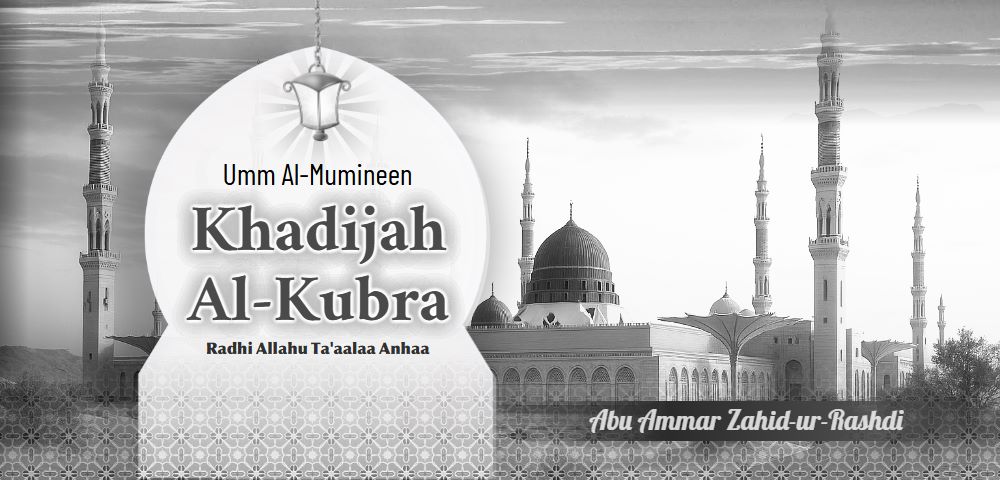Ummul-Mumineen Khadija Radhi Allahu Anhaa

The household of Prophet Muhammad (peace be upon him) began with his marriage to Ummul-Mumineen Khadijah al-Kubra (may Allah be pleased with her). While residing in Makkah, the Prophet (peace be upon him) did not marry another woman during her lifetime. He was twenty-five years old at the time of their marriage, and they remained together for twenty-five years. Khadijah (may Allah be pleased with her) passed away in the eleventh year of Prophethood.
She was the Prophet’s first wife and the mother of his children. All of his offspring—except for Ibrahim (may Allah be pleased with him)—were born to Ummul-Mumineen Khadijah. These included four daughters and three to five sons, according to differing narrations. Qasim (may Allah be pleased with him) reportedly lived nearly to adolescence, rode horses by the age of thirteen or fourteen, and passed away. Due to him, the Prophet (peace be upon him) was called “Abul Qasim.” Other sons named include Abdullah, Tahir, and Tayyib, though none reached adulthood. His daughters grew up, were married, and had children. The Prophet (peace be upon him) lovingly raised his daughters and even cared for their children. Though he had no biological grandson, he raised one as if he were: Usamah ibn Zayd (may Allah be pleased with him) was nurtured in the Prophet’s care and received love like a grandson.
Speaking of Ummul-Mumineen Khadijah al-Kubra (may Allah be pleased with her), the marital love and bond between her and the Prophet (peace be upon him) is a timeless example for the entire world. She was a prominent and wealthy woman of Makkah, and she spent all her wealth in the service of the Prophet (peace be upon him). He used to say he could never forget the kindness of two individuals who sacrificed everything for him—among men, Abu Bakr (may Allah be pleased with him), and among women, Ummul-Mumineen Khadijah (may Allah be pleased with her).
When the Angel Jibreel (Gabriel, peace be upon him) brought the first revelation in the Cave of Hira, it was a sudden experience for the Prophet (peace be upon him). He accepted the divine message, but the extraordinary nature of the event weighed heavily on him. After the revelation, he returned home and shared the experience with Ummul-Mumineen Khadijah (may Allah be pleased with her). She is the noble wife of the Prophet (peace be upon him) and remains a revered mother of Muslims until the Day of Judgment. The Prophet (peace be upon him) said Khadijah (may Allah be pleased with her) was the most generous woman toward him personally. She was highly intelligent and deeply understanding. Upon hearing what had happened in the cave, and noticing his natural concern, her first response was: By Allah, He will never disgrace you. She reassured him that Allah would never abandon him. She explained: انک لتصل الرحم وتحمل الکل وتکسب المعدوم و تقری الضیف و تعین علیٰ نوائب الحق You uphold family ties, support the helpless, provide for the needy, host guests with generosity, and aid those facing hardship in the path of truth.
In essence, Allah does not forsake someone who serves society and supports the vulnerable. The Prophet’s earliest public recognition came as someone who helped widows, orphans, and the impoverished. Social service is a right of society, and the Prophet (peace be upon him) fulfilled this duty himself while also teaching it to others.
Ummul-Mumineen Khadijah (may Allah be pleased with her) always remained close to the Prophet’s heart. She passed away in Makkah during the eleventh year of Prophethood. After migrating to Madinah, the Prophet (peace be upon him) entered into other marriages. Among them, Ummul-Mumineen Aisha (may Allah be pleased with her) was the most beloved. She was the daughter of Abu Bakr (may Allah be pleased with him), a woman of brilliant intellect, and was blessed with many virtues by Allah. Though she had many co-wives, the Prophet (peace be upon him) had nine at one time, she confessed feeling strongest jealousy not toward any living companion, but whenever the Prophet frequently spoke about Khadijah (may Allah be pleased with her): “Khadijah was like this,” “Khadijah did that.” According to a narration in Sahih Bukhari, Ummul-Mumineen Aisha (may Allah be pleased with her) once said: O Messenger of Allah, do you never forget that old woman? Allah has granted you better wives now. To which the Prophet (peace be upon him) replied: Aisha, she was my companion in hardship. A companion in hardship is never forgotten. How can I forget the time of trials, pain, and adversity?
The deaths of Khadijah (may Allah be pleased with her) and the Prophet’s uncle Abu Talib occurred around the same time. At home, Khadijah was the greatest support, and outside the home, it was Abu Talib. Though he did not accept Islam, history attests that he fully upheld his role as an uncle and protector. He even stood with the Prophet (peace be upon him) during the siege of Sha’b Abu Talib. While Abu Talib was alive, no one dared confront the Prophet directly; any complaints were addressed to him. His presence carried weight. The year in which both Abu Talib and Khadijah passed away was extremely sorrowful for the Prophet (peace be upon him), as he lost two of his greatest worldly supporters. He declared that year عام الحزن (the year of sorrow).
Translations
(الشریعہ — اگست ۲۰۲۵ء)

